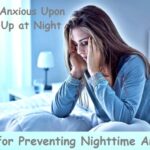9 Factors Behind Your Sleep Troubles
“Insomnia occurs when individuals struggle to initiate and maintain sleep. Various factors, such as lifestyle choices, medications, or both physical and mental health issues, can hinder the ability to fall asleep. Explore nine common causes of sleep difficulties and effective strategies to address them, along with guidance on seeking professional medical advice when needed.”
1. Alcohol Consumption
Although alcohol may induce drowsiness initially, it can disrupt the quality of your sleep later on. Consuming alcohol alters the duration of the rapid eye movement (REM) sleep stage, crucial for processing emotional memories.
2. Sleep Environment and Habits
Pre-sleep activities significantly influence your ability to fall asleep. For instance, daytime napping, particularly in the evening, can impede desired sleep onset. Other habits that may affect sleep include:
- Panrticipating in activities that elevate heart rate or consuming heavy meals within two hours of bedtime
- Engaging in screen use just before sleep
- Remaining awake in bed for more than 15 to 20 minutes
3. Caffeine Intake
While consuming caffeine earlier in the day is generally acceptable, having it near bedtime can pose challenges. Although caffeine can offer an energy surge and enhance alertness, its effects can linger for up to six hours. If you consume a caffeinated beverage within six hours of your usual bedtime, it may hinder sleepiness and prevent you from falling asleep.
4. Persistent Pain
People experiencing persistent pain, lasting beyond three months, frequently experience inadequate sleep or report disrupted sleep patterns. The relationship between persistent pain and sleep is reciprocal. Persistent pain not only contributes to challenges in both initiating and maintaining sleep, but insufficient sleep may also result in:
- Reduced functionality
- Heightened physical inactivity
- Prolonged pain duration
- Intensified pain perception
5. Jet Lag
Jet lag occurs when your circadian rhythm, the natural 24-hour sleep-wake cycle, becomes out of sync with a new time zone. This misalignment can temporarily disrupt your ability to fall asleep as your body adapts to the new time zone. Additionally, you may experience daytime fatigue, difficulty waking, and other related symptoms.
6. Medications
Specific categories of medications can contribute to or exacerbate insomnia, including:
- Antidepressants
- Antiseizure medications
- Asthma treatments
- Heart medications like albuterol
- Oral contraceptives
- Over-the-counter remedies for allergies, colds, or flu
- Steroids
- Thyroid hormone medications
7. Mental Health Conditions
Sleep disturbances are often intertwined with mental health conditions, particularly mood disorders. Some mental health conditions associated with insomnia comprise:
- Anxiety disorders, including posttraumatic stress disorder (PTSD)
- Attention-deficit/hyperactivity disorder (ADHD)
- Bipolar disorder
- Depressive disorders, including seasonal affective disorder
- Schizophrenia
- Substance use disorders
8. Night Shift Employment
Studies indicate that individuals working night shifts encounter sleep deprivation and increased drowsiness while on duty. Similar to the effects of jet lag, night shift work can disrupt a person’s circadian rhythm.
Night shift workers are required to stay awake during nighttime hours when they would typically be asleep. This can pose challenges in falling asleep once their shift concludes at daybreak, as exposure to sunlight signals wakefulness.
9. Stress
Encountering stressful situations can impede falling asleep, a phenomenon quantified by sleep reactivity.
Sleep reactivity gauges the extent to which stress disrupts an individual’s sleep. Studies reveal that individuals with low sleep reactivity generally encounter fewer sleep-related challenges during periods of stress. Conversely, those with high sleep reactivity endure more significant sleep disturbances when under stress.
What to Do When Sleep Eludes You
When you find yourself unable to sleep, consider the following strategies:
Practice mindful breathing:
Engage in simple breathing exercises to calm your mind. Deep, slow breaths can lower your heart rate, particularly beneficial if you’re feeling anxious or stressed.
Change your environment:
If you remain awake in bed for more than 20–30 minutes, get up and engage in quiet activities until you feel sleepy again.
Listen to a podcast or audiobook:
Opt for audio content as an alternative to reading, especially if you prefer not to use artificial light or strain your eyes. Select topics that are neither overly stimulating nor distressing.
Create a to-do list:
Spend a few minutes detailing upcoming tasks before bedtime. Research suggests that composing a comprehensive to-do list of future responsibilities can expedite sleep onset compared to reflecting on completed tasks from the day.
Read a physical book:
Avoid digital screens, which emit blue light that can disrupt sleep. Instead, immerse yourself in a printed book to unwind before sleep.
Experiment with calming sounds:
Consider using a white noise machine or app to evoke relaxation and tranquility, potentially alleviating racing thoughts.
When to Consult a Healthcare Professional
While occasional sleepless nights are common, persistent difficulty falling asleep warrants a conversation with a healthcare provider. They can assist in assessing whether any existing medications or lifestyle factors contribute to your insomnia and provide appropriate interventions.
Sleep medications
Sleep medications whether available over-the-counter or through prescription, are not advisable as the primary course of treatment and are not intended for prolonged use. Over time, your body can develop a tolerance to over-the-counter medications, diminishing their effectiveness.
6 Foods That Enhance Sleep Quality
Consuming relaxing beverages and incorporating calming products into your routine can enhance your sleep patterns. Adjusting your dietary habits can be an effective strategy to alleviate insomnia.
Enhance the quality of your nightly sleep by incorporating the following foods and beverages into your diet:
1. Bananas and Almonds
Enjoy half a banana paired with a handful of almonds to provide your body with carbohydrates, magnesium, and tryptophan—a combination known to promote quicker sleep onset.
2. Crackers and Peanut Butter
Combine complex carbohydrates and tryptophan by pairing organic peanut butter with whole-grain crackers for another effective sleep-inducing snack.
3. Milk
The tradition of drinking warm milk before bedtime holds merit, as it contains calcium, magnesium, and tryptophan, which collectively have a relaxing effect on the nervous system. Consume milk in moderation to avoid disrupting sleep with nighttime bathroom trips.
4. Cereal and Milk
Combine milk, a source of tryptophan, with a small serving of whole-grain cereal or oatmeal before bed to capitalize on the sleep-promoting effects of complex carbohydrates and melatonin.
5. Turkey
Create a turkey sandwich using whole-wheat bread to benefit from the complex carbohydrates and magnesium in the bread, as well as the tryptophan abundant in turkey. Add a dollop of low-sugar cranberry sauce for additional flavor, if desired.
6. Herbal Tea
Opt for decaffeinated herbal teas such as chamomile, passionflower, valerian, or mint in the evening to soothe and sedate the body. Sweeten with a touch of honey to further enhance the sleep-inducing effects, as honey contains tryptophan. Avoid stimulatory herbs like ginseng to ensure restful sleep.
A Brief Overview
Various factors can contribute to difficulty falling asleep, including bedtime habits, stress, chronic pain, or mental health disorders.
Employing relaxation techniques or incorporating calming sounds can aid in promoting sleep.
If self-care strategies prove ineffective, consulting a healthcare provider is advisable for persistent sleep disturbances.
People Asked
1. How can I alleviate my insomnia?
- Therapy
- Create a conducive sleep environment in your bedroom. *Maintain consistent sleep and wake times daily, including weekends.
- Refrain from consuming caffeine, nicotine, and alcohol close to bedtime.
- Engage in regular physical activity during the daytime, ensuring it concludes at least 5 to 6 hours before bedtime. *Avoid napping, particularly in the afternoon.
2. What beverages can I consume to promote quicker sleep onset?
Chamomile valerian teas are commonly consumed before bedtime for their sleep-inducing properties, while almond milk and cherry juice are also popular options. Although certain drinks contain tryptophan or melatonin, recognized for their sleep-enhancing effects, the mechanisms behind the sleep-promoting properties of other beverages remain uncertain.
3. What is the 321 technique for better sleep?
- 3 hours before bedtime: Refrain from consuming food or alcohol.
- 2 hours before bedtime: Cease all work-related activities.
- 1 hour before bedtime: Minimize screen exposure by turning off electronic devices such as phones, TVs, and computers.
- 0: The ideal number of times you’ll need to hit the snooze button in the morning.
In the Nutshell
In conclusion, understanding the nine factors behind sleep troubles and implementing strategies to address them can significantly improve sleep quality and overall well-being.
By acknowledging the importance of factors such as sleep hygiene, stress management, and mental health, individuals can take proactive steps towards achieving restful and rejuvenating sleep.
By prioritizing healthy lifestyle habits, establishing consistent sleep patterns, and seeking professional guidance when needed, individuals can effectively address sleep issues and experience the countless benefits of a good night’s sleep.
Ultimately, by recognizing the interconnectedness of various factors influencing sleep and adopting tailored strategies to address them, individuals can pave the way for better sleep and enhanced overall health and vitality.







Pingback: Ayurveda: - HinduLekh
Pingback: Title - HinduLekh
Самые свежие события модного мира.
Абсолютно все эвенты известнейших подуимов.
Модные дома, торговые марки, гедонизм.
Приятное место для трендовых хайпбистов.
https://metamoda.ru/
https://metamoda.ru/
Наиболее актуальные новости мира fashion.
Актуальные новости лучших подуимов.
Модные дома, лейблы, haute couture.
Самое лучшее место для модных людей.
https://fashionablelook.ru
Несомненно стильные новости индустрии.
Актуальные новости мировых подуимов.
Модные дома, бренды, высокая мода.
Самое приятное место для трендовых людей.
https://myfashionacademy.ru/
Полностью свежие новинки индустрии.
Абсолютно все новости всемирных подуимов.
Модные дома, бренды, haute couture.
Интересное место для модных хайпбистов.
https://modavgorode.ru
Полностью важные события модного мира.
Важные эвенты лучших подуимов.
Модные дома, торговые марки, высокая мода.
Самое лучшее место для модных людей.
https://modaizkomoda.ru
Точно свежие новинки мировых подиумов.
Актуальные мероприятия самых влиятельных подуимов.
Модные дома, торговые марки, гедонизм.
Интересное место для трендовых хайпбистов.
https://metamoda.ru/moda/599-doja-cat-vyzvala-bezumie-v-tope-i-yubke-iz-pishchevoy-plenki-s-rezhisserom-vetements-guram-gvasalia/
You really make it appear really easy with your presentation however
I in finding this matter to be actually one thing which I think I’d by no means understand.
It kind of feels too complicated and very large for me.
I’m taking a look forward in your next post,
I will attempt to get the grasp of it! Escape room lista
I was studying some of your posts on this internet site and I think this internet site is rattling instructive!
Retain posting.?
I truly love your website.. Excellent colors & theme. Did you build this site yourself? Please reply back as I’m trying to create my very own blog and want to find out where you got this from or what the theme is named. Cheers!